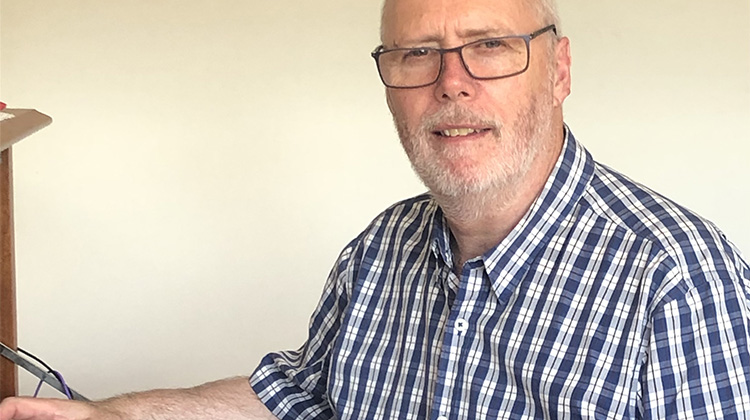STEM not just for boffins says electrical engineer

Electrical engineer Robbie Bell believes the cliché of a stereotypical ‘boffin’ can block students from visualising themselves in STEM careers.
Through the STEM Professionals in Schools program, Bell and the teacher he is partnered with are finding unique ways to show students that coding, mathematics, and engineering are already a big part of their day-to-day lives.
From school to STEM professional
Robbie was not what he would describe as “academically gifted” in high school.
“I was a lousy student. I enjoyed school, but academically, I’m sure my teachers considered me a poor performer,” said Robbie.
“It wasn’t until I was an electrical apprentice at TAFE that the STEM principles we were learning about in class really clicked for me. It started to hold some meaning and I could see how it could achieve a purpose.”
Robbie then completed his apprenticeship as an electrical fitter, which he immediately followed up with a para-professional certificate in electrical engineering. He then went on to work the next 15 years in mining and smelting, where he became more involved with controls and automation. At 35, he returned to university and completed a degree in electrical engineering. It’s what he now enjoys doing in his current role working in hydro power stations in Tasmania.
“My job is a mixture of working in the office and in the field. I’ve enjoyed a varied career. And it hasn’t stopped me from pursuing opportunities to evolve or try something new. It’s something that I would like students today to understand about what engineering has to offer.”
Robbie enjoys regular opportunities to share his experience through STEM Professionals in Schools. His partnership with Lynne Hanlon at Bowen Road Primary School, Tasmania enables multiple classrooms to get involved and benefit from the industry connection.
From light switch circuits to remote-powered hydro stations
“Lynne was interested in exploring coding with the students to support the science and digital technology aspects of the Australian curriculum. Coding is not something that teachers specialise in ordinarily unless they have a personal interest. And naturally, I found myself in an excellent position to assist,” said Robbie.
Throughout the school year, Robbie runs two-hour sessions for several classrooms. He kicks off with a career talk before working with teachers to take the students through a series of activities. These demonstrate coding and its application in the real world.
“I try to make it accessible by starting with the physical things the kids could see and recognise. These include small batteries, switches, and some LEDs. We started off building a simple two-way light circuit – something the students might recognise from their light switches at home.”
From there, the classes graduate to software, repeating the exercise using an automation platform with the same switches and LEDs. But this time, they use code in between. After that, they build everything within the computer. Finally, the classes can see it in action in the real world – and on a big scale.
“As a ‘show and tell’ I can bring up a display on my laptop. It demonstrates what the machines at work are doing, in real time,” said Robbie.
“It worked particularly well recently because I knew that a machine was going to be starting at a particular time. So, we were able to connect up as a class and watch that come to life remotely. It’s a nice way to end our little journey of discovery. I am able to show them the full spectrum from little blinking lights in class, to a power station helping to power an entire state.”
Six hours can make a lifetime of difference
Robbie says that volunteering is part of his personal ethos. His workplace is also supportive, sharing his view that it’s a community service.
His visits to the schools are a small contribution with significant benefits, says Lynne.
“Most of our students come from low-socio-economic backgrounds with minimal aspiration for tertiary study. Having a mentor who has both industry experience and studied at university level is a great example for our student cohort.”
“Some of the students have attended holiday workshops or coding classes because they or their parents have had an interest. When Robbie attends and shares some of what he knows with the whole class, it means that every student has had some exposure. Additionally, it provides an opportunity to get excited about a personal achievement in coding, like building a circuit or even a simple game.
“Robbie shared his diverse working life and makes the key message that all training and experience contributes to the next career move. Most knowledge is transferable and useful.”